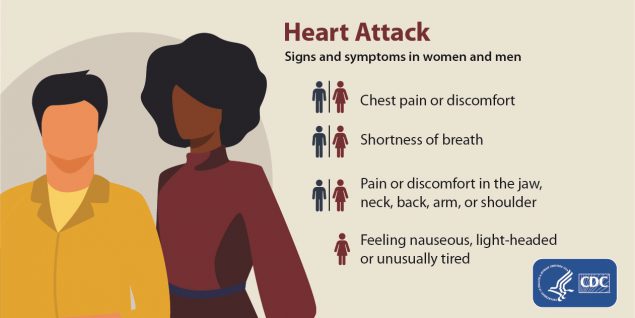Uncomfortable chest pressure or pain lasting more than a few minutes, pain in the arms, back, neck, jaw or stomach, and shortness of breath are common symptoms of a heart problem in women. Other signs may include fatigue, nausea, dizziness, and fluttering feelings in the chest.
It's important for women to be aware of these symptoms and seek medical attention if they experience them. Heart disease is often seen as a condition affecting men, but it is the leading cause of death among women. Understanding the symptoms can help women identify potential heart problems early on and receive the necessary treatment to prevent further complications.
Recognizing Symptoms
Recognizing symptoms of heart problems in women is crucial for early intervention. Common signs include chest discomfort, shortness of breath, pain in the arms, back, neck, and stomach, as well as unusual fatigue. It's important to be vigilant and seek medical attention if these symptoms are experienced.
Recognizing Symptoms Recognizing the symptoms of a heart problem in women is crucial for early detection and timely intervention. Women often experience different signs compared to men when it comes to heart issues. Being aware of these symptoms can help women take control of their health and seek medical attention when needed. In this section, we will explore the different signs in women and the common symptoms of heart failure.
Different Signs In Women
Women may experience unique signs that indicate a potential heart problem. While chest pain is a well-known symptom, women may also present with other less recognizable indicators. These signs are often mistaken for less life-threatening conditions, making it essential to raise awareness about them:
- Uncomfortable pressure, squeezing, fullness, or pain in the center of the chest
- Pain or discomfort in one or both arms, the back, neck, jaw, or stomach
- Shortness of breath with or without chest discomfort
It's important for women to pay attention to these symptoms and not dismiss them as something less significant. Identifying them early can potentially save lives and prevent serious heart complications.
Common Symptoms Of Heart Failure
Heart failure is a condition where the heart is unable to pump blood efficiently. The following symptoms are commonly associated with heart failure:
- Shortness of breath, especially during physical exertion or when lying flat
- Persistent coughing or wheezing
- Swelling in the legs, ankles, or feet, caused by fluid retention
- Fatigue or feeling unusually tired
- Rapid or irregular heartbeat (palpitations)
These symptoms may vary from person to person, and it's important to note that not all women will experience these signs. However, if you notice any of these symptoms persistently, it is crucial to consult a healthcare professional for proper evaluation and diagnosis. In conclusion, recognizing the symptoms of heart problems in women is vital for early detection and effective treatment.
Women may experience different signs compared to men, and being aware of these indicators can help in seeking timely medical attention. Additionally, understanding the common symptoms of heart failure can aid in identifying potential heart issues.
By taking prompt action, women can prioritize their heart health and reduce the risk of complications.

Credit: utswmed.org
Understanding Heart Attack
A heart attack, also known as a myocardial infarction, occurs when the blood flow to the heart is blocked, usually by a blood clot. This obstruction prevents oxygen and nutrients from reaching the heart muscle, causing it to be damaged or even destroyed.
Heart attacks are often associated with symptoms that are commonly seen in men, such as chest pain, but it's important to note that the symptoms can differ in women. Recognizing the symptoms of a heart problem in women is crucial for early detection and timely medical intervention.
Chest Discomfort
- Uncomfortable pressure, squeezing, fullness, or pain in the center of the chest
- Pain that lasts more than a few minutes or comes and goes
- Pain or discomfort in the arms, back, neck, jaw, or stomach
When women experience chest discomfort, they may describe it as an intense pressure or a feeling of tightness in the chest. It's important to take note that chest discomfort in women may not always be severe or immediately recognizable as a heart problem.
Sometimes it can be mistaken for indigestion or acid reflux. Thus, it's crucial not to ignore any unexplained chest discomfort and seek medical attention if it persists or worsens.
Shortness Of Breath
Unexplained shortness of breath, even without any chest discomfort, can be a symptom of a heart problem in women. This can manifest as difficulty in breathing, a feeling of breathlessness, or the inability to catch one's breath. It may occur during regular activities or even at rest.
Women who experience persistent shortness of breath should seek medical attention to rule out any underlying heart issue.
It's important to note that these two symptoms, chest discomfort and shortness of breath, are not exclusive to heart problems and can be related to other conditions as well.
However, they are often warning signs that should not be ignored, especially in women. Prompt medical evaluation can help determine the root cause and provide appropriate treatment.
Identifying Risk Factors
Identifying the risk factors associated with heart problems in women is crucial for early detection and prevention. By understanding the first signs and symptoms, as well as the presence of cardiac anxiety, women can take proactive steps to protect their heart health.
First Signs And Symptoms
- Bold, squeezing, or fullness in the center of the chest that lasts more than a few minutes or comes and goes
- Pain or discomfort in one or both arms, back, neck, jaw, or stomach
- Shortness of breath, with or without chest discomfort
- Feeling nauseous, lightheaded, or unusually tired
If you experience any of these symptoms, it’s important not to ignore them. They could be indicators of a potential heart problem, and seeking medical attention promptly can be life-saving.
Cardiac Anxiety In Women
Cardiac anxiety is another risk factor that women should be aware of. It refers to significant worry or fear about having a heart attack or other heart-related issues. Women who experience cardiac anxiety may feel panicky or mistake their anxiety symptoms for a heart attack.
If you frequently experience panic disorder or have ongoing anxiety, it's essential to differentiate between anxiety-related symptoms and heart-related symptoms. Consulting with a healthcare professional can provide clarity and alleviate concerns.
By understanding and recognizing the risk factors, women can take a proactive approach to their heart health. Regular check-ups, maintaining a healthy lifestyle, and managing stress are important steps in preventing heart problems and enjoying a long and healthy life.

Credit: www.cdc.gov
Seeking Medical Help
When it comes to heart problems, early detection and prompt medical attention are vital for women. If you experience any symptoms related to a heart problem, it is crucial to seek medical help immediately. Ignoring or dismissing these symptoms could have serious consequences for your health.
Awareness Of Symptoms
Being aware of the common symptoms of a heart problem in women is the first step towards seeking medical help. Familiarizing yourself with these symptoms can enable you to recognize any potential warning signs and take appropriate action. Some of the key symptoms to watch out for include:
- Chest discomfort: Uncomfortable pressure, squeezing, fullness, or pain in the center of your chest that lasts more than a few minutes or comes and goes.
- Arm, back, neck, jaw, or stomach pain: Pain or discomfort in one or both arms, the back, neck, jaw, or stomach.
- Shortness of breath: Difficulty breathing or a feeling of breathlessness, either with or without chest discomfort.
- Nausea, lightheadedness, or fatigue: Feeling nauseous, light-headed, unusually tired, or experiencing a general feeling of fatigue.
If you notice any of these symptoms, it is important not to ignore them. Listen to your body and take them seriously, even if they seem mild or intermittent. Trust your instincts and seek medical help to ensure proper evaluation and diagnosis.
When To Call The Doctor
Knowing when to call the doctor is crucial when it comes to potential heart problems. If you experience any of the symptoms mentioned above, it is recommended to promptly reach out to your healthcare provider or call emergency services. Additionally, there are other situations in which seeking medical help is essential:
- Symptoms persist or worsen: If your symptoms persist, worsen, or become more frequent, do not hesitate to contact your doctor. It is better to be safe and proactive in these situations.
- New or unusual symptoms: Any new or unusual symptoms that you haven't experienced before should be discussed with a medical professional. They can evaluate whether these symptoms are related to a heart problem or another underlying issue.
- Concerns about your heart health: If you have concerns about your heart health, such as a family history of heart disease or risk factors like high blood pressure or diabetes, it is important to consult with a healthcare provider and discuss appropriate preventive measures.
Remember, seeking medical help in a timely manner can help prevent complications and ensure proper diagnosis and treatment. It's always better to be proactive when it comes to your heart health.

Credit: www.heart.org
Frequently Asked Questions For What Are The Symptoms Of A Heart Problem In A Woman?
What Does A Heart Blockage Feel Like In A Woman?
A heart blockage in a woman may feel like uncomfortable pressure, squeezing, or pain in the chest. It can also cause pain or discomfort in the arms, back, neck, jaw, or stomach, as well as shortness of breath.
What Are 3 Warning Signs Of A Heart Attack In Females?
Signs of a heart attack in females include chest pain or discomfort that lasts more than a few minutes, pain or discomfort in one or both arms, the back, neck, jaw, or stomach, and shortness of breath.
What Are At Least 3 Early Warning Signs Of Heart Disease?
1. Uncomfortable pressure or pain in the center of the chest that lasts more than a few minutes. 2. Pain or discomfort in the arms, back, neck, jaw, or stomach. 3. Shortness of breath, with or without chest discomfort.
What Are The Symptoms Of Cardiac Anxiety?
Symptoms of cardiac anxiety include panic disorder, extreme agitation, dizziness, chest pains, stomach discomfort, shortness of breath, and rapid heart rate. These symptoms may be mistaken for a heart attack or associated with underlying cardiac disease.
Conclusion
It's important for women to be aware of the symptoms of a heart problem in order to seek medical attention promptly. Symptoms can vary but may include chest pain or discomfort, shortness of breath, pain in the jaw, neck, back, arm, or shoulder, and feelings of nausea, lightheadedness, or fatigue.
It's crucial not to ignore these signs and to consult a healthcare professional for an accurate diagnosis and appropriate treatment. Taking care of our heart health should always be a priority.






0 Comments